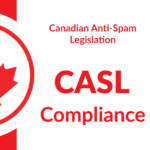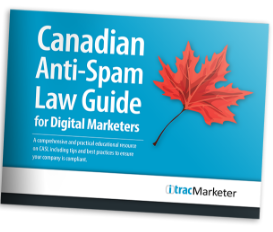The Canadian Anti-Spam Law (CASL) came into effect on July 1st, 2014 and has been phased-in over a three-year period to help companies transition email marketing communication practices. Part of this delay was to allow organizations a sufficient amount of time to get proper consent collection processes in place. In addition this extended period of time was to be used to collect and update the consent status of email contacts on an email database from implied consent to express consent.
A significant deadline to the Canadian Anti-Spam Law is now set to occur on July 1st 2017 and it’s impact will have a substantial effect on companies that rely on email to influence their business results.
If your organization uses email marketing activities that drive revenue, this is one update you can not afford to ignore.
The Issue
Since the launch of CASL all businesses or individuals that have been using email for “Commercial Electronic Messages” (CEM) were able to have the email consent status of individuals on their email lists ‘grandfathered in’ as risk-free implied consent status. This is due to the fact that these emails were obtained before CASL requirements were in place.
However, the deadline of this ‘grandfathered’ consent status is now set to expire within several months and companies should be aware of the number of email contacts that they will no longer be able to send communications to.
Organizations that have not taken a proactive and organized approach to managing their email database and CASL consent status should address this upcoming impact to their marketing campaigns and business messages immediately.
The Impact
As a provider of email marketing technology, services and CASL compliant functionality itracMarketer works with a large number of companies across industries and based upon our experience we believe that the impact of the July 1st, 2017 CASL date could reduce the amount of email sent by 25% on average and upwards of 60% for some businesses.
[bctt tweet=”The impact of the July 1st, 2017 CASL date could reduce the amount of email sent by 25% #CASL” username=”@itracMarketer”]
Companies that have not put proper CASL email management processes in place and continue to send messages out to individuals that have expired on their database can run the risk of severe consequences as witnessed from the fines imposed upon large brands such as Roger’s Communications, Porter Airlines and most recently Kellogg’s Canada.
In addition, another substantial change to the Canadian Anti-Spam Law occurs on July 1st, 2017 that further increases the risk that companies may be prosecuted and see monetary penalties and brand damage impact their business. As of this date consumers will have the ability to take the law into their own hands by taking advantage of the right to private action. According to a previous study that we conducted 54% of consumers are likely to participate in a class-action lawsuit against a company for CASL violations.
What to do?
The first thing you should do is to investigate the consent status of email contacts on the email database of your company and understand the impact of this upcoming deadline to your business and email marketing practices. This analysis should determine the priority and amount of effort that your organization should undertake to address this potential concern.

TIP: Make sure your database is up-to-date. Identifying whether or not an email address on your database is specific to an existing or recent customer is an important aspect of managing your organization CASL compliance.
A customer can have their ‘implied’ consent status renewed for 24 months from the last transaction date that you have done business with them.
Aside from properly managing the expiry dates of consent status on your database to reduce the risk of violating CASL you should think about an overall strategy and plan to convert the ‘implied’ consent contacts to ‘express’ consent. Express consent is a documented agreement stating that the customer has agreed to accept “commercial electronic messages” (CEM). Once express consent is given, it never expires unless the person unsubscribes.
Unfortunately there is not one simple solution or silver bullet to collect express consent from your email contacts, however there are a few strategies that your company can implement to help work on this area of CASL compliance and mitigate the loss of many email permissions.
CASL Consent Conversion Strategy
You may have all the correct consent information updated to all of your email contacts but to maintain and grow a healthy email list or database it is advisable to put in place a strategy to convert implied consents to express consent on an ongoing basis.
We do not recommend a simple batch and blast approach to asking individuals for express consent out of the blue. Many businesses found out with the introduction of CASL in 2014 that one-off marketing campaigns without valid context to ask for express consent does not produce great results and even worse, can provide an unpleasant customer experience.
Having a multi-channel strategy that takes into consideration relevancy and recent engagement with an individual can make a big difference in your ability to obtain express consent. For example, if a recent email sent to an implied consent individual has generated some interest in content or a product found on a business website then with appropriate technology it is possible to recognize this person and populate an instant request to capture consent from the individual in the moment.
Another opportunity may exist through a call center interaction whereby a confirmation or transactional message could also include link to collect express consent from an individual.
Again, there is no universal solution to quickly collecting a significant number of express consents through conversion tactics but a well thought out strategy with constant and automated initiatives can generate great results over time. The sooner you can address this before your ‘Grandfathered’ implied consent emails expire the better.
Still worried that you aren’t CASL compliant?

Leave A Comment